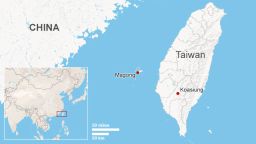Story highlights
NEW: Taiwan's leader raised the issue of military tensions with China's leader
Presidents of China and Taiwan hold landmark meeting
Analysts say talks may be aimed at influencing upcoming Taiwan elections
When the Presidents of China and Taiwan shook hands on Saturday, they reached across a gap that has yawned between the two sides since 1949, in the wake of China’s civil war.
Then, the Communist Party took control of the majority of China and Chiang Kai-shek’s Nationalists fled to Taiwan. The mainland became the People’s Republic of China; Taiwan took the name Republic of China and embraced democracy.
Mistrust and fear of more bloodshed between them have haunted them for decades.
Chinese President Xi Jinping and Taiwanese President Ma Ying-jeou met in a third-party country – Singapore. They eschewed their presidential titles and address each other simply as “Mr.”
In a Thursday press conference, Ma said that the two sides would even split the bill for their hotel and meal costs.
What may seem like informal manners was actually governed by a complicated protocol reflecting the bitter history between the two. Every gesture they made has been closely scrutinized.
Improvement? Perhaps, perhaps not
The two men sounded upbeat in their public statements.
“Today marks a new chapter in the cross-strait relationship,” Xi told journalists. “The separation of families on both sides of the Taiwan strait has caused deep pain and regrets to countless families.”
Ma called for a hotline between Taiwan and the mainland to deal with urgent matters.
“I call for (a) reduction of hostility, and for the resolution of disputes with peaceful measures,” he said. “I call for enhancement of cross-strait exchange, and reinforcement of win-win.”
But Ma’s political opposition in Taiwan is displeased with the meeting with Xi, and with an election around the corner, they are ahead in the polls. Ma’s visit could boost his party’s standing, analysts say, but it also might not.
Protesters took to the street in Taiwan’s capital Taipei to voice protest against the meeting.
Taiwan politics
Ma is the former head of the Kuomintang (KMT) party, and has been a key driver in forging closer ties with Beijing since he came to power in a 2008 election.
Tsai Ing-wen, the head of the opposition Democratic Progressive Party (DPP) and the leading candidate to replace Ma in the January elections, has spoken out against his rival’s historic meeting with Xi on Saturday.
The KMT’s candidate Eric Chiu is trailing Tsai by a wide margin, and Ma cannot run because of term limits. If the positive effects of closer ties between China and Taiwan don’t weigh well in the balance, Ma’s party could lose by a landslide.
China sees Taiwan as a renegade province, which heats up resentment in Taiwan. Beijing has warned that a formal declaration of independence by Taiwan could lead to military intervention.
To this day, it’s reported to have missiles pointed at the island of 22 million people.
Ma raised the issue with Xi on Saturday.
“I have expressed people’s concerns over the deployment of hostile military presence against Taiwan, including missiles. Xi told me that those are not targeted at Taiwan,” Ma said.
Xi: One country, not two
On Saturday, Xi reinforced Beijing’s stance that Taiwan is a Chinese province.
In a closed door meeting, he told Ma that the cross-strait relationship is not a relationship between two countries, is not the relationship between China and Taiwan. Territories on both sides of the strait belong to the same country, this is a historical fact, and the legal foundation of this fact cannot and will not change, he said, according to China’s Taiwan Affairs Office.
That will likely not sit well with many in Taiwan.
Ma told journalists that Taiwan agreed with China’s One China Policy, “but we continue to differ on its definition.”
Despite differences, both sides have made strides toward each other over the last seven years.
“Since 2008, the cross-strait relations have moved on to a path of peaceful development, and have been increasingly stabilized in the past seven years, thanks to the efforts of many people on both sides of the Taiwan Strait,” Xi said.

No agreements
Both sides have said that no agreements would be signed at the meeting, but that they would discuss ways to cement peace.
“If Xi tries to put down any markers about improving political ties or setting any deadlines for steps toward reunification, it will cause a massive anti-Beijing backlash across Taiwan,” said Robert Manning, senior fellow at the Atlantic Council.
READ: Explained: Why historic meeting matters
Despite the rift, China is Taiwan’s biggest trade partner, hundreds of flights go between the two nations each week and Chinese banks now operate on the island, while some Taiwanese companies have factories in China.
MORE: Summit: Empty symbolism or game changer?
MORE: Behind threats and supercharged rhetoric: Trade
CNN’s Shen Lu in Beijing contributed to this report



















